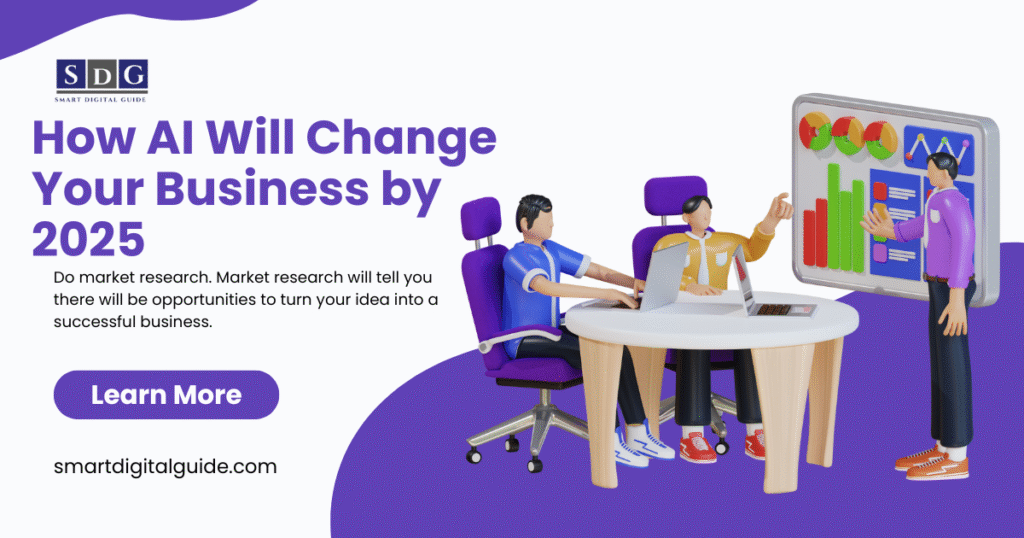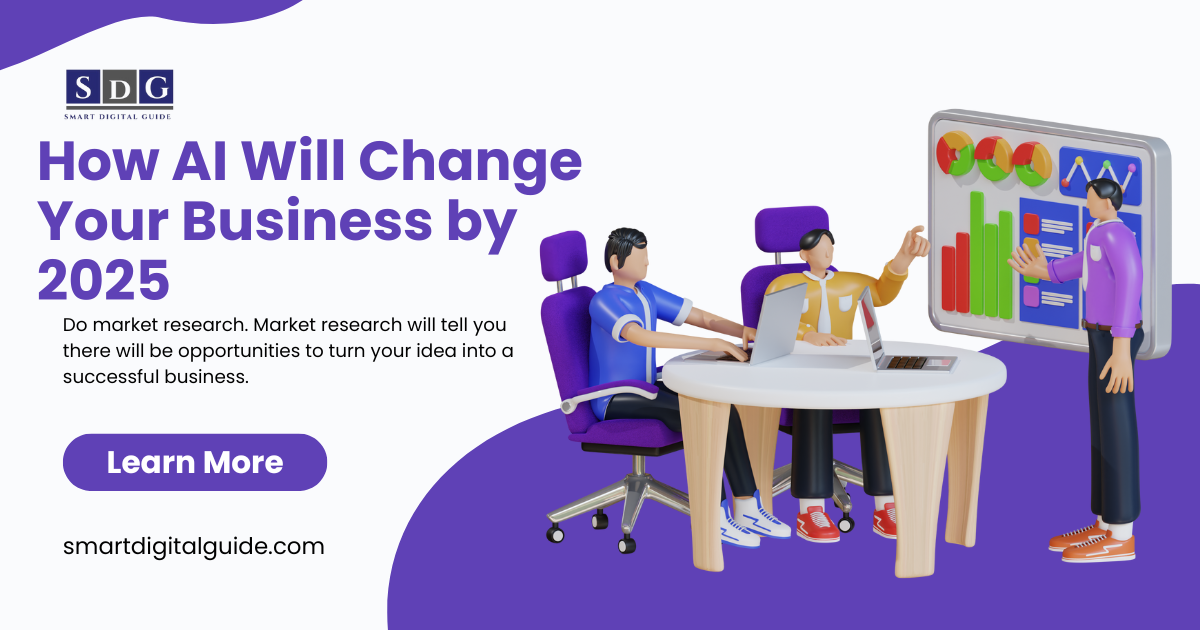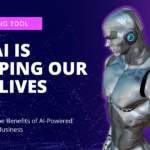Artificial Intelligence (AI) has moved beyond being a speculative idea—it is now a pivotal force that is transforming various industries worldwide. As we progress into 2025, the rate of AI adoption is increasing rapidly, leading to significant shifts in business operations, decision-making processes, and customer interactions. Whether you are an entrepreneur at a startup or managing a large corporation, grasping how AI will impact your business by 2025 is crucial for maintaining competitiveness.

1. Enhanced Decision-Making with Predictive Analytics
One of the most substantial effects of AI is its capacity to process vast quantities of data and provide actionable insights. By 2025, predictive analytics will be intricately woven into essential business functions. From anticipating market dynamics to recognizing potential customer turnover before it occurs, AI technologies can analyze numbers and trends far exceeding human capabilities.
Organizations such as Amazon and Netflix have already established standards in utilizing AI for data-centric decisions, and this practice will only become more common. Smaller enterprises will also gain access to cost-effective AI solutions designed for advanced forecasting, inventory management, and sales analysis.
2. Advanced Automation Beyond the Essentials
By 2025, automation will transcend basic chatbots and scheduling applications, evolving into fully integrated AI systems capable of managing complicated workflows. In sectors such as finance, human resources, and logistics, artificial intelligence will streamline routine yet essential tasks like processing invoices, recruiting talent, ensuring compliance, and overseeing supply chains.
For instance, combining robotic process automation (RPA) with AI will empower companies to reduce errors in manual data entry, enhance operational efficiency significantly, and allow employees to focus on more strategic functions. Organizations that implement AI-driven automation strategies will be able to maintain a more streamlined operation while expanding rapidly.
3. Transforming Customer Experience
Artificial intelligence is reshaping customer service into a highly personalized activity that’s proactive and available around the clock. By 2025, AI-infused chatbots and virtual assistants are expected to become so advanced that many customers may not even realize they’re engaging with an automated system. These tools will address inquiries, resolve problems efficiently, and boost sales through real-time upselling or cross-selling.
Crucially, AI can scrutinize customer behavior across various platforms to provide exceptionally tailored experiences. For example, it can suggest products based on users’ browsing habits or deliver customized marketing content while dynamically adjusting prices according to demand—ultimately leading to improved customer satisfaction and loyalty.
4. Intelligent Marketing Approaches
In the realm of marketing, AI is set to create a significant transformation. Platforms powered by AI are now capable of examining user activity, categorizing audiences, creating content, and fine-tuning advertising campaigns with minimal manual oversight.
By 2025, it is anticipated that marketing teams will extensively utilize AI tools to perform A/B testing, produce SEO-optimized material, forecast user intentions, and even craft visuals through generative AI. This transition will render marketing more data-informed, scalable, and quantifiable—enabling companies to enhance their ROI effectively.
5. Improved Cybersecurity and Risk Management
As digitalization expands, so does the risk of vulnerabilities. By 2025, AI will be pivotal in safeguarding business operations. Tools driven by AI can identify threats in real time, detect patterns indicative of suspicious activities, and autonomously respond to attacks—often preemptively avoiding harm.
6. Enhanced Talent Management and Recruitment
The landscape of hiring and employee involvement will undergo a significant shift thanks to AI advancements. Tasks such as resume filtering, scheduling interviews, and assessing candidates can now be executed more swiftly and with greater impartiality through the use of AI algorithms.
Additionally, platforms that utilize AI can keep track of employee performance, recommend tailored training programs, and forecast potential turnover risks. By 2025, HR departments are expected to depend on AI not only for recruitment but also for fostering a culture centered around continual learning and career growth.
7. Innovation in Products Using AI
AI will serve as an essential partner in product creation across sectors like manufacturing, healthcare, and consumer products. By pinpointing market needs and simulating results effectively, AI technologies will significantly shorten both the development timeline and expenses associated with bringing new products to market.
For example, Tesla incorporates AI within its self-driving technology while also employing it for product evaluation and improvement. By 2025, integrating AI into research and development processes is anticipated to become standard practice among companies aiming to maintain a competitive edge amid evolving market demands.
Furthermore, AI will assist in monitoring compliance and evaluating risks. For example, within the financial industry, AI can highlight irregularities in transactions to ensure adherence to regulations while diminishing the chances of fraud occurring.
8. Cost Reduction and Competitive Advantage
One of the most compelling reasons businesses will continue adopting AI in 2025 is the cost benefit. AI minimizes wastage, reduces labor costs, improves speed and accuracy, and eliminates inefficiencies across departments.
Early adopters of AI are already gaining a competitive edge, and as tools become more accessible, lagging behind will no longer be an option. Companies that fail to integrate AI into their operations risk becoming obsolete in an increasingly tech-first marketplace.
Final Thoughts
AI is not just a trend—it’s a strategic business enabler. By 2025, companies that understand and embrace AI will not only survive but thrive in the new digital economy. From streamlining operations and delighting customers to driving innovation and improving security, the possibilities are endless.
If your business hasn’t started investing in AI yet, now is the time. The future isn’t waiting, and neither is your competition.









